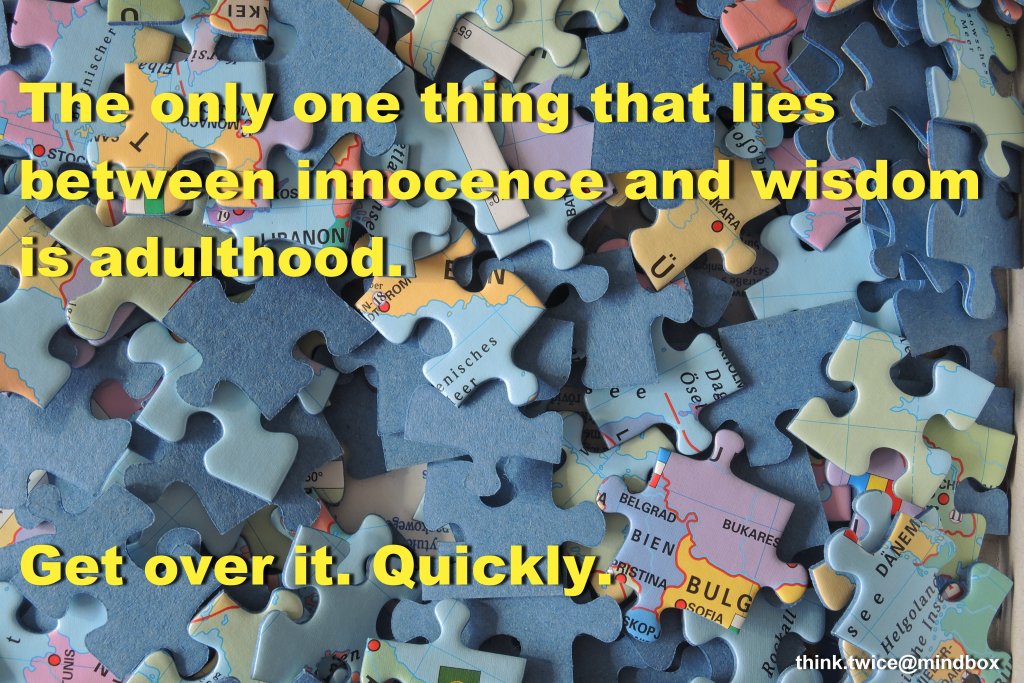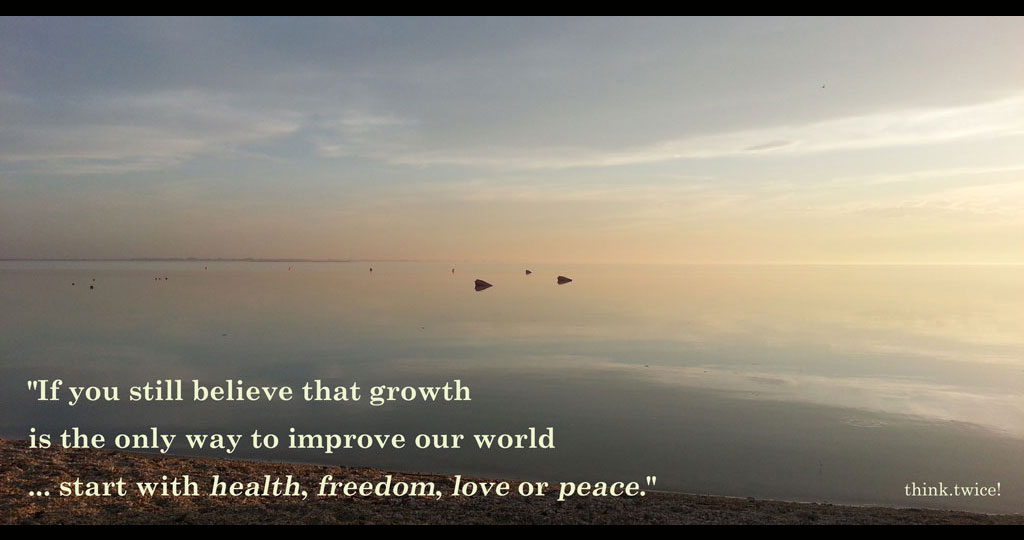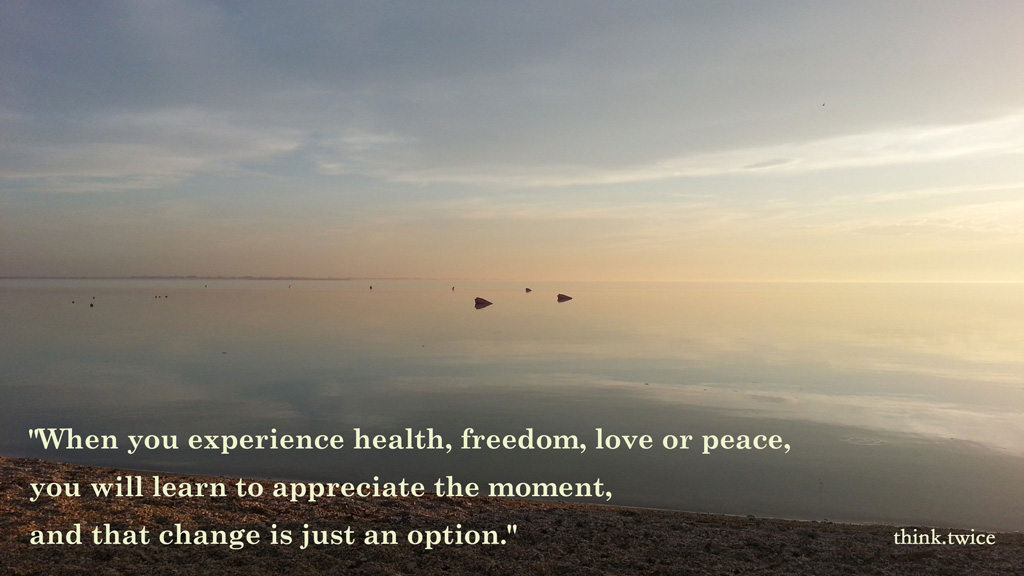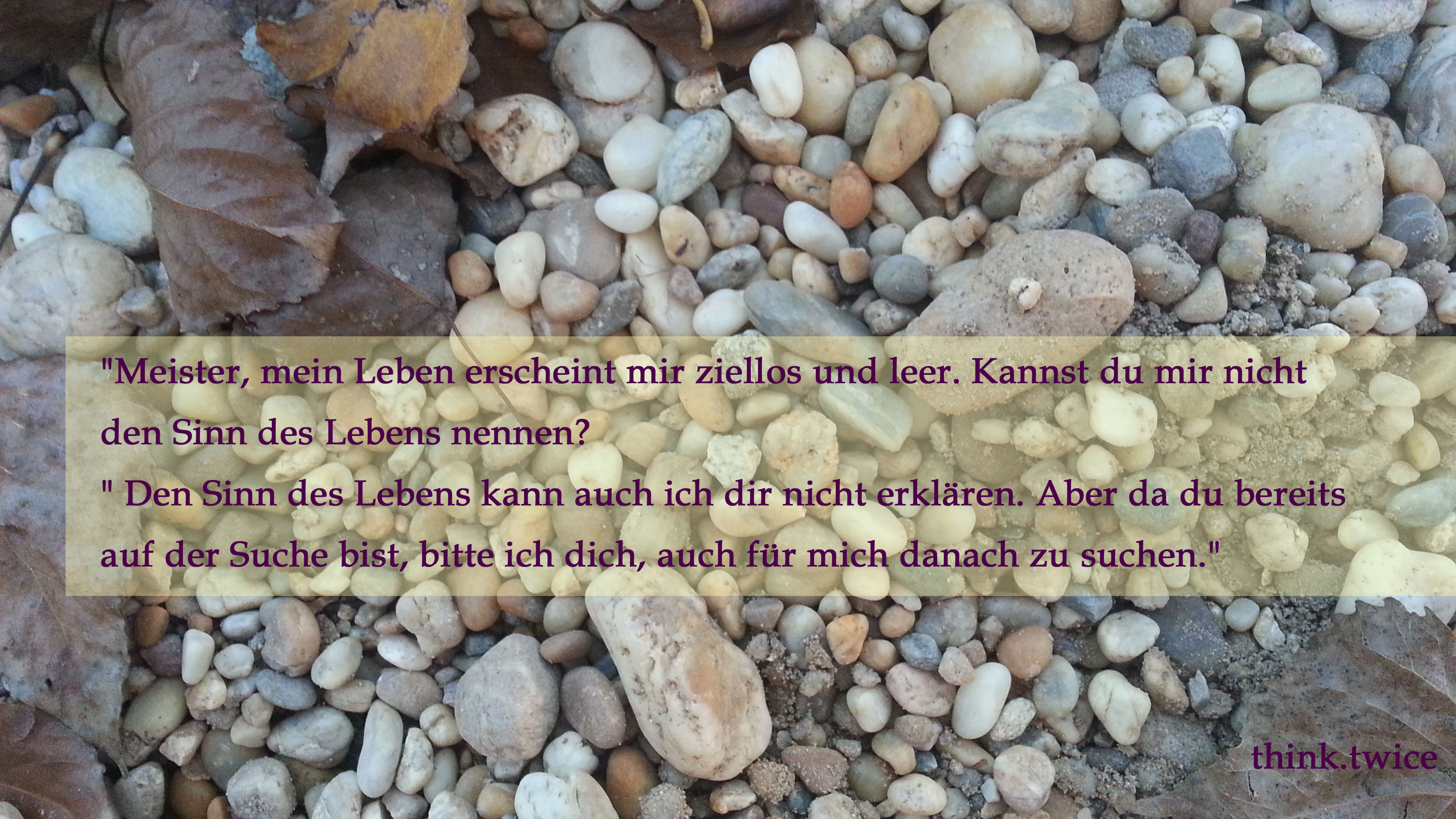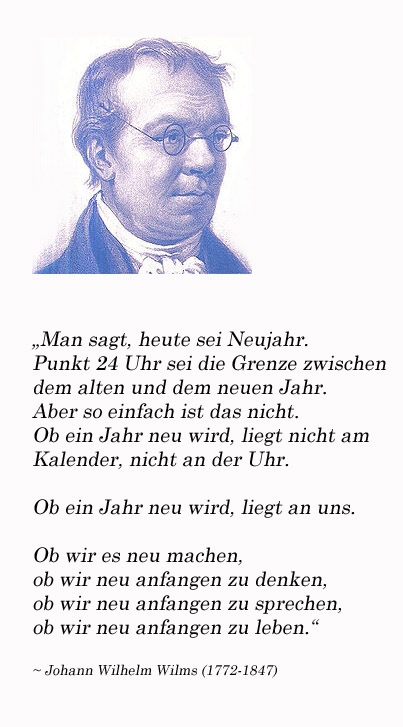
Author Archives: Marcus Pietrzak
Summertime
“Moments that make you happy
are like little bread crumbs
that lead to your purpose.”

Between innocence and wisdom
Where unlimited growth may still be good for us
“If you still believe that growth is the only way to improve our world … start with health, freedom, love or peace.”
While economy is based on the assumption that only growth in production and consumption will lead to more prosperity, it appears there is a movement that started to acknowledge more universal desires, which instead are not seeking out quantitative growth. There is a new quest for less consumption, but better experiences, or fundamental qualities in life: health, freedom, love and peace. We see an uprising of being versus having, quality versus quantity, experience versus possession.
Change is no more the sole vehicle for economic growth alone; change has become an option, and keeping the status quo has become an alternative again. While the change hype has turned ‘being conservative’ a bad term, most of us will indisputabley agree on many values – like nature, freedom, love and peace – which deserve to be protected and preserved.
This is not about stagnation. It is about a progressive change of our values system.
If we wish to pursue a sustainable growth and development, we need to move away from the illusion of endless materialistic growth. We need to move towards ethically inspired concepts of qualitative growth, that – even when wasted or pervasively brought forward to all the people in this world – may bring qualitative prosperity to every human being, and pave the way to a sustainable future.
One of the major steps to take will be the change of our measurement systems. We will not be able to measure the qualitative growth and progress in simple spreadsheets or existing currencies of the financial world. We will need to agree on a new currency, that denominates not financial wealth, but sustainability, quality of living, universal values.
This shall not become a fight against economy, nor shall it neglect existing realities. It is a sigh of hope that we can all hear if we listen with care and awareness.
Today, I have a more sound belief, that across any given culture in our diverse world, we ultimately share the same values, if we only take it to a high enough level. I have a hope that, fueled by our ability to overcome biological determinism, we take the chance to work on a joint future, create a higher set of values that unite, and abdicate those that have taught us the opposite.
– map
Live in the moment, where change is just an option
Defining the new leader
“The type of products and services we want to deliver tomorrow will require a new type of leader today.”
From a recent design lab for executive potentials, I posted some impressions to my corporate blog. One reader got stuck on my notion of “a new type of leader”. He claimed, that “…a leader is a leader is a leader”.
While I intuitively seemed to understand him, I followed this invitation to a more elaborate expression of my initial thoughts:
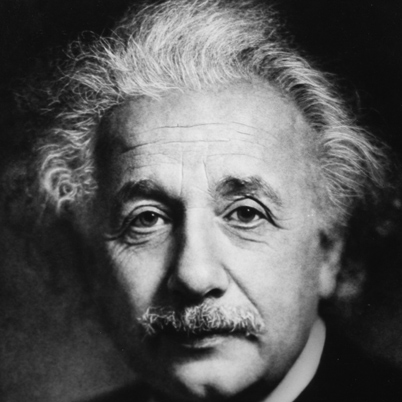
“The significant problems we face cannot be solved at the same level of thinking we were at when we created them”. (Albert Einstein)
Is that a good first answer to why we need a new type of leader?
In more detail, I could agree, that great leadership is great leadership. Yet I’d even more agree if we’d say, that different context requires different types of leaders.
Now, trying to define exactly what type of leaders and which characteristics we need at which times, is a very different question. Today, much of our discussion at the design lab lead us to framing the characteristics of ‘leadership’. And trust me, the different perspectives were vast! – To illustrate this, e.g. when trying to find common grounds on what defines ‘experience’ and ‘journey’ for us, we easily filled one flip chart for each term; yet for leadership, we even had to stop ourselves after two overcrowded charts, and I trust you all could have added even more to that! Having said this, my personal view is, there isn’t one single definition, characteristic or trait of great leadership.
For myself, great leadership is a mix of the right things at the right times.
So how do we want to develop leaders after all, if I argue there is no one single definition to it?
Well, does it need to be either this trait or that trait, this set of behaviours or other behaviours which are the ‘right ones’? Does universal leadership exist at all? – Of course we could use big terms that are abstract and vague enough, so that we find agreement about what great leaders all have in common. But can we do the same on behavioural level? And even if we’d work under the assumption, that the ‘right leadership behaviour’ exists as long as we know the given environment – would this not require us to predict the future environment of our future leaders?
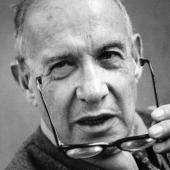
“Trying to predict the future is like trying to drive down a country road at night with no lights while looking out the back window.” – (Peter Drucker)
Maybe we find a way to accept that, as long as we equip leaders to make the right choices at the right times, so that they navigate the challenges of the future – guided by a simple set of principles values or mindset – they will be effective in terms of great leadership?
If we dare to play with this thought, we might end in what Gary Hamel calls ‘management innovation‘, which he defines as “anything that substantially alters the way in which the work of management is carried out, or significantly modifies customary organizational forms, and, by so doing, advances organizational goals. Put simply, management innovation changes the way managers do what they do, and does so in a way that enhances organizational performance.” (The Future of Management, 2007).
With this, I trust that successful leaders of the future will be able to serve both the people they lead, build the organisations that host these people, and fit this all into the world we live in. Those leaders will acknowledge that long-term uncertainty is and always has been the norm, and that an ever changing world requires a constant adaptation of their own being. Leaders of the future will need to integrate both the people, strategy and the organisations they create, and get solid in their self-awareness, self-management and purpose. The task ahead for us is to identify the early indicators of these characteristics.
I might have an opinion there, but there is more work to be done still…
(map)
“I wish you sufficient !”
A father and his daughter hugged each other intimately and warmly at the airport.
Both did not know if they would ever meet again.
The father was very old and a serious illness plagued him.
The daughter had left home with her husband many years ago, and they lived far, far away and could not come very often to visit.
Finally it was time for the daughter to get onto the plane.
“I love you, I wish you sufficient!”, said the father to his daughter.
“I love you too, Dad. I wish you also sufficient!”, she replied.
A passenger observed the scene could not hold back to ask the father after the farewell: “What does that mean, when you wished another “sufficient”.
“That’s a wish that has been passed down in our family from generation to generation,” the man replied.
“It means:
I wish you sufficient sun,
so your life may be bright.
I wish you sufficient rain,
so you can appreciate the sun.
I wish you sufficient luck,
so you can preserve your love.
I wish you sufficient sorrows,
so your smallest pleasures appear big.
I wish you sufficient profit,
so you get everything you need.
I wish you sufficient loss,
so you can appreciate everything you have.
I wish you are welcomed sufficiently often,
so you feel safe and loved when finally saying good-bye.”
(unknown)
Six Reasons Your Best Employees Quit You – Forbes
Sinn des Lebens
Be an example
“Your example, even more than your words, will be an eloquent lesson to the world.”
– Madeleine Sophie Barat (1779-1865, founder of the Society of the Sacred Heart)

